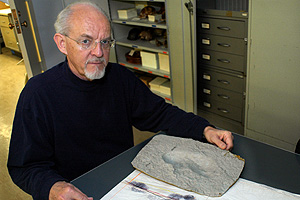Russell Tuttle, Professor in Anthropology and the College
By William HarmsNews Office
 Russell Tuttle | |
Whether studying fossils, cadavers or the careers of celebrity scientists, students in Russell Tuttle’s Anthropology classes learn to solve puzzles and think critically.
“I want them to be able to think clearly and independently and to write well,” said Tuttle, Professor in Anthropology and the College. Tuttle, who specializes in human evolution and has a strong research interest in non-human primates, promotes critical thinking by making sure students understand the limits of what a scientist can claim to be true.
“If you look at a fossilized bone fragment, for instance you can say two things about it: one is what you know as a scientist and the other is essentially a story—what you think its connection might be to evolution. That’s where you can go astray because there is such little evidence in a bone fragment that you have to be careful not to put together a story that overstates its importance,” he explained.
Tuttle introduces his students to the rigors of scientific work in a class on the anatomy of apes and monkeys in which students actually dissect them. “They need to learn the correct vocabulary and also to understand how to recognize a muscle or a bone three dimensionally. It’s much different from seeing a picture in a book,” he said.
He encourages students to take detailed notes as he discusses the body parts because they will need to later identify them during a lab exercise. “If a student has trouble figuring something out, how a structure might function in the specimen, I usually start by determining what they understand about it from the shape and relation to neighboring structures, and then how it would work given what they know about life in the wild.”
For a class on the evolution of apes and monkeys, as in his other classes, Tuttle stresses the importance of writing. “I think scientists need to learn to write clearly. Two of my favorite teachers were high school English and history teachers who encouraged my interests and independent, critical thinking. One of my favorite teachers in college also was an English teacher. I try to convey to students the importance of understanding the history of the field they are studying.” Students can develop critical thinking skills by reading the great works of evolutionary scholars and comparing that work with current scholarship, he said.
Students also learn about the evolution of apes and monkeys by imagining themselves as non-human primates living in captivity either at Lincoln Park Zoo or Brookfield Zoo, and then writing about it. “They have to compare environments and learn that it’s not all necessarily bad to be in a zoo—you get fed regularly and there’s lots of leisure time.”
When students are not immersed in the anatomy and behavior of non-human primates, they might be enrolled in Tuttle’s course on celebrities in science, where they learn that fame has many facets. According to Tuttle, some celebrity paleoanthropologists have resorted to unethical or at least questionable behavior during their careers, exploiting their celebrity for personal gain while charging large fees for personal visits or by selling autographs to young fans.
Tuttle also established a scientifically based liberal arts program for undergraduates in Tanzania with the Associated Colleges of the Midwest, and initiated a practical and popular course in ethnographic methods while directing the undergraduate program in Anthropology.
“The ACM program has turned out wonderfully. Students have become very interested in Africa, and some join the Peace Corps or dedicate their medical careers to cure malaria or other tropical diseases,” he said. “What I think is important about the ethnographic course is that the students learn how to conduct research ethically, what is the correct way to interview somebody and report on that interview in a way that both informs and protects confidentiality.”
Learning to think critically and solve problems includes respecting other people and being ethical, Tuttle contends.
![[Chronicle]](/images/sidebar_header_oct06.gif)